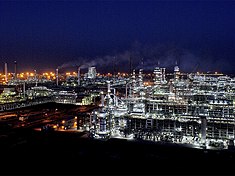Jamnagar Refinery
 The Jamnagar Refinery at night | |
| Country | India |
|---|---|
| State | Gujarat |
| City | Motikhavdi, Jamnagar |
| Coordinates | 22°20′53″N 69°52′8″E / 22.34806°N 69.86889°E |
| Refinery details | |
| Owner(s) | Reliance Industries Limited |
| Commissioned | 14 July 1999 |
| Capacity | 1,440,000 bbl/d (229,000 m3/d) |
| Complexity index | 21.1[1] |
The Jamnagar Refinery is a private sector crude oil refinery owned by Reliance Industries in Motikhavdi, Jamnagar, Gujarat, India. The refinery was commissioned on 14 July 1999 with an installed capacity of 668,000 barrels per day (106,200 m3/d). Its current installed capacity is 1,240,000 barrels per day (197,000 m3/d).[2] It is currently the largest refinery in the world.[3]
History
[edit]On 25 December 2001, Reliance Petroleum Limited (RPL) announced the commissioning of its refinery into a Special Economic Zone in Jamnagar district of Gujarat, India. The completion of the RPL refinery has enabled Jamnagar to emerge as a 'Refinery land', housing the world's largest refining complex with an aggregate refining capacity of 1.24 million barrels (197,000 m3) of oil per day, more than any other single location in the world.[4]
The globally competitive RPL refinery was commissioned in 36 months. RPL contracted several companies having expertise in engineering construction and refining like Bechtel, UOP LLC and Foster Wheeler (multinational corporation) amongst others. There were plans for the pipeline to process High Pour Point crude oil extracted at Barmer, Rajasthan, although this would require an electrically heated traced pipeline to be set up from Barmer to Jamnagar.[5]
The entire complex, as of 2013, consists of manufacturing and allied facilities, utilities, off-sites, port facilities and a township (415 acres) with housing for its 2,500 employees, on over 7,500 acres (3,000 ha; 11.7 sq mi) of land. If all of the pipes used in the refinery were laid out, one after another, they would connect the whole of India from north to south.[6][7]
Export expansion during the 2020 COVID-19 pandemic
[edit]In 2019, during the COVID-19 pandemic the domestic demand for polymer strongly declined in India. As a result, in order to keep production and sales running, Reliance Industries Limited management decided to refocus the production of polymer on export markets. With the help of the Maersk shipping and logistics group, exports from the Jamnagar Refinery were quadrupled to over 10,000 x 40' containers, which transported and exported through Port Pipavav.[8]
See also
[edit]References
[edit]- ^ "Integrated Annual Report 2018-2019" (PDF). Reliance Industries Limited. 2019.
Jamnagar site has a complexity index of 21.1
- ^ "Petroleum Refining & Marketing".
- ^ "Reliance commissions world's biggest refinery". The Indian Express. 26 December 2008. Retrieved 9 January 2019.
- ^ "Growth through Energy Products". Archived from the original on 27 February 2007.
- ^ "Cairn India starts work on Barmer-Jamnagar pipeline project". www.projectstoday.com. Retrieved 31 October 2020.
- ^ "RIL's Jamnagar Refinery Listed Among The World's Top Five Refineries". Archived from the original on 6 June 2013.
- ^ "About Jamnagar" (PDF). Archived from the original (PDF) on 27 October 2011.
- ^ "Keeping supply chains moving during COVID-19". Maersk. 8 July 2020. Retrieved 14 April 2021.

